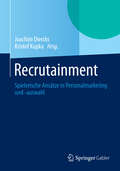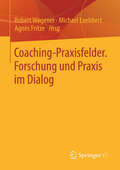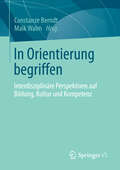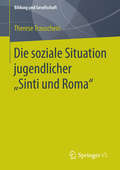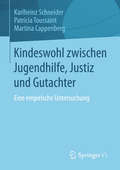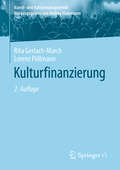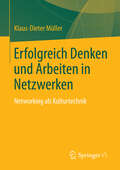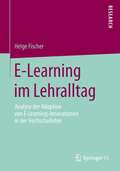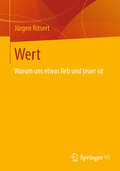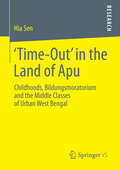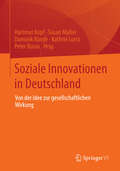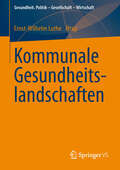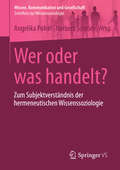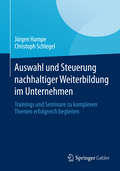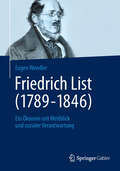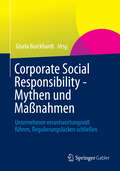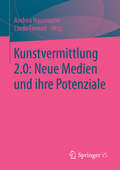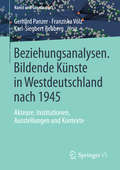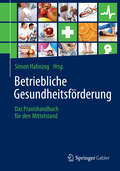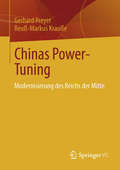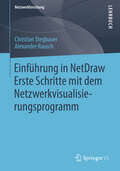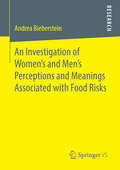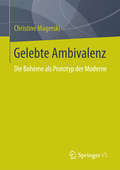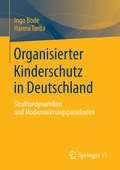- Table View
- List View
Recrutainment: Spielerische Ansätze in Personalmarketing und -auswahl
by Joachim Diercks and Kristof KupkaUm gute Mitarbeiter zu finden, reichen die üblichen Wege im Recruiting längst nicht mehr aus: Immer mehr Organisationen setzen auf Recrutainment, also den Einsatz spielerisch-simulativer Elemente in Berufsorientierung, Employer Branding, Personalmarketing und Recruiting.Self-Assessments, unterhaltsam und informativ gestaltete Online-Assessments, Berufsorientierungsspiele oder auch Offline-Recrutainment-Events verbessern nachweislich das stimmige Zusammenfinden von Kandidat und Arbeitgeber und versprechen so nicht nur eine optimale Stellenbesetzung, sondern stärken auch das Profil der Arbeitgebermarke. Das Buch liefert das theoretische Fundament für das Thema Recrutainment und erklärt, warum dessen Bedeutung in den letzten Jahren so stark zugenommen hat. Es werden die Auswirkungen von Recrutainment auf Organisationen und Bewerber unter Einbeziehung von aktuellen Studien beleuchtet. In ausgewählten Best Practice Beispielen stellen verschiedene Autoren dar, wie Recrutainment in der Unternehmenspraxis eingesetzt wird.
Promovieren nach Plan?
by Navina Roman Svea KorffDer Bologna-Prozess hat auch die Promotion erreicht: Mit der stärkeren Strukturierung der Promotionsphase bzw. einem "Promovieren nach Plan" ist nicht nur die Hoffnung verbunden, die Anzahl der Promotionen zu erhöhen, die Promotionszeiten zu verkürzen und damit den Wissenschaftsstandort Deutschland zu stärken, sondern es soll auch die Situation junger Nachwuchswissenschaftlerinnen verbessert bzw. für mehr Chancengleichheit sorgen. Wie aber die Promotionsphase "strukturiert" wird und welche Bedeutung dies für die Chancengleichheit hat, ist bisher kaum erforscht. Die vorliegende Untersuchung analysiert die strukturierte Promotionsförderung darum mit Hilfe eines mehrdimensionalen Untersuchungsdesigns: Durchgeführt wurden neben einer deutschlandweiten und fächerübergreifenden Online-Befragung von Promovierenden in Programmen strukturierter Promotion, eine Diskursanalyse, eine Bestandsaufnahme von Programmen strukturierter Promotion, sowie Gruppendiskussionen und ExpertInneninterviews. Dieses Vorgehen ermöglicht eine umfassende Perspektive auf das strukturierte Promovieren - unter besonderer Berücksichtigung von Gender- und Diversity-Aspekten - in Deutschland.
Coaching-Praxisfelder. Forschung und Praxis im Dialog: Forschung Und Praxis Im Dialog
by Robert Wegener, Michael Loebbert and Agnès FritzeCoaching ist längst nicht mehr nur in der Führungskräfteentwicklung und im Sport anzutreffen. Auch im Kontext weiterer Handlungsfelder wie beispielsweise der Politik, dem Gesundheitssektor, der Sozialen Arbeit oder der Wissenschaft findet Coaching vermehrt Verbreitung. Die rasche Weiterentwicklung von Coaching aufnehmend, leistet diese Publikation einen Beitrag dazu, die Konturen der immer deutlicher erkennbaren Coaching-Praxisfelder nachzuzeichnen. Mit den Beiträgen international namhafter Expertinnen und Experten aus dem deutsch- und englischsprachigen Raum werden dazu aktuelle Erkenntnisse aus Wissenschaft und Praxis präsentiert. Einen weiteren Teil der Publikation bilden Coaching-Praxisfelder übergreifende Themen wie Coaching-Programme, moderne Medien und Evaluationsansätze.
In Orientierung begriffen
by Constanze Berndt Maik WalmBildung, Kultur und Kompetenz spielen in Diskursen moderner Gesellschaften eine herausgehobene Rolle und stellen deshalb zentrale Referenzpunkte des (erziehungs)wissenschaftlichen Denkens dar. Die hier versammelten Beiträge zielen darauf ab, Orientierungspunkte zu geben, um disziplinäre Standortbestimmungen zu befördern und Institutionen wie Kindertagesstätten, Schulen und Hochschulen kritisch zu analysieren und reflektiert zu begleiten.
Die soziale Situation jugendlicher "Sinti und Roma"
by Therese TrauscheinDas Buch behandelt die (Aus-)bildungs-, Wohnungs-, Freizeit- sowie Familiensituation von dauerhaft in Deutschland lebenden ,,Sinti und Roma"-Kindern und -Jugendlichen. Neben der theoretischen Auseinandersetzung wurden qualitative Interviews mit ,,Sinti und Roma" im Alter von 12 bis 21 Jahren geführt. Die weitgehend vorurteilsgeprägte gesellschaftliche Wahrnehmung von ,,Sinti und Roma" soll mit deren Lebensrealitäten kontrastiert werden. Es gilt insbesondere pädagogisch Tätige zur Reflexion der eigenen Haltung gegenüber dem Thema anzuregen. Notwendig erscheint auch eine generelle Neubetrachtung von ,,Ethnizität" und ,,Kultur", zwei Begriffen, denen nicht nur innerhalb der Debatte um ,,Sinti und Roma" ein besonderer Stellenwert zugesprochen wird.
Kindeswohl zwischen Jugendhilfe, Justiz und Gutachter
by Karlheinz Schneider Patricia Toussaint Martina CappenbergZur Zweckverwirklichung Kindeswohl gibt der Gesetzgeber den an Verfahren beteiligten Professionen unbestimmte Rechtsbegriffe an die Hand. Um diese fallgerecht anzuwenden, bedarf es interprofessioneller Kommunikation, ohne welche Familienrichter/innen in der Wahrnehmung ihrer Aufgabe regelhaft überfordert wären. Allerdings kommunizieren die Professionen auf der Basis ihrer je fachwissenschaftlich-berufsspezifischen Methodik, was zu Missverständnissen und Konflikten führen kann. Diese im Interesse am Kindeswohl aufzulösen, bedarf einer dialogischen Rechtfindung. Im Fokus dieser Studie stehen zwei Grundfragen: wann und unter welchen Bedingungen die Kindeswohlorientierung verloren zu gehen scheint, wann eine dialogische Rechtsfindung gelingt und wann sie warum scheitert.
Kulturfinanzierung (Kunst- und Kulturmanagement)
by Lorenz Pöllmann Rita Gerlach-MarchDieses Lehrbuch stellt Finanzierungsformen für Kulturbetriebe vor, ohne die Bereiche Staat, Markt und gemeinnütziger Sektor kategorisch zu trennen, da sie einander durchdringen und Kulturschaffende Grenzgänger zwischen diesen Welten sind. Nach einer theoretischen Einführung werden externe Finanzierungsquellen, öffentliche und private Mittel sowie neue Formen der „gemischten" Kulturfinanzierung beleuchtet, worauf von den Kulturinstitutionen selbst erwirtschaftete Einnahmen folgen. Sie werden jeweils kurz eingeführt und aktuell praxisorientiert illustriert. Dabei liegt das Augenmerk auf besonders innovativen Finanzierungsmodellen, und erfolgreiche Beispiele werden als „best practice" detailliert beschrieben.
Erfolgreich Denken und Arbeiten in Netzwerken: Networking als Kulturtechnik
by Klaus-Dieter MüllerDas Zusammenleben der Menschen hat sich verändert und erfordert entsprechende Verhaltensweisen. Wo Gewissheiten verloren gehen, muss gleichwohl etwas existieren, was die Gemeinschaft zusammen hält. Dieses verbindende Element ist das Netz in all seinen personalen (haptischen) und auch digitalen Formen bis hin zum Crowd Funding. Netze sollen einen Nutzen haben für die Karriere, das Einkommen und für den sozialen Status. Nutzen, Zweck und Wert sind darum drei wesentliche Elemente der Netzwerkarbeit. Klaus-Dieter Müller legt dabei besonderen Wert auf die menschlichen Aspekte von Networking. Dahinter steht ein von ihm vertretenes Menschenbild, nämlich das Selbst als Dreh- und Angelpunkt seines Wirkens in der Welt. Die Identität des Individuums wird zu einem Problem der gesellschaftlichen Moderne. Es kommt nun darauf an, den Zusammenhang zwischen Selbst und Netz zu erkennen. Der Autor liefert viele Tipps, Hinweise und Erfahrungsberichte dazu, wie der Zweck und Nutzen eines Netzwerks mit den eigenen Befindlichkeiten und der Stellung in der Welt in Übereinstimmung zu bringen sind. Netzwerkarbeit ist eine Kulturtechnik, ähnlich wie Lesen und Schreiben, sie kann Gegenstand von Unterricht, Training und Beratung sein.
E-Learning im Lehralltag: Analyse der Adoption von E-Learning-Innovationen in der Hochschullehre
by Helge FischerAusgelöst durch sich wandelnde Anforderungen von Studierenden und Öffentlichkeit sowie veränderte politische und ökonomische Rahmenbedingungen wächst der Reformdruck auf Hochschulen. Die Einführung technologiegestützter Lehr- und Lernmethoden (E-Learning) erlaubt den Hochschulakteuren die Flankierung dieser Neuordnungen und zusätzliche strategische Positionierung. Ausgangspunkt von E-Learning-Einführungs- und Förderstrategien sind die individuellen Anforderungen und Bedarfe des akademischen Lehrpersonals. Die Dissertation liefert die Grundlagen für die zielgruppenspezifische Förderung der E-Learning-Nutzung in der Hochschullehre. Dafür wird einerseits ein Bezugsrahmen hergeleitet, der den Prozess der E-Learning-Adoption strukturiert und Ansatzpunkte für Interventionen deutlich macht. Zudem wurden anhand einer explorativen Studie E-Learning-Übernehmertypen innerhalb des akademischen Lehrpersonals identifiziert und charakterisiert.
Wert: Warum uns etwas lieb und teuer ist
by Jürgen Ritsert"Wert" ist ein Grundbegriff, der im Alltag sowie in einer ganzen Reihe von Fachwissenschaften meist mit aller Selbstverständlichkeit benutzt wird: in der Moralphilosophie, der Ökonomie, der Politologie, der Soziologie, der Ethnologie und der Kulturanthropologie. Doch er ist und bleibt - wie schon Max Weber festgestellt hat - ein "Schmerzenskind" der Kulturwissenschaften. Dieser Essay informiert über einige Kontroversen über den Wertbegriff sowie einige begehbare Pfade in der Sumpflandschaft des Wertdiskurses. Der Text steht in einem inneren Zusammenhang mit den beiden Essays des Verfassers über den Problembegriff und vier Grundbegriffe der politischen Philosophie (2012).
'Time-Out' in the Land of Apu
by Hia Sen Within Childhood Research starkly different theoretical and empirical concerns characterize the global south-north divide. Hia Sen attempts to bridge the gap in Childhood Research which usually addresses childhoods differently according to their 'developing/developed', 'western/non-western' contexts, and finds its middle ground in the context of the urban middle classes in contemporary West Bengal. The author documents areas such as leisure practices and everyday lives of school children in India for three cohorts, where it is possible to have a comparative perspective of childhoods given the existing rich ethnographic and historical research on childhoods in other cultural contexts.
Soziale Innovationen in Deutschland
by Hartmut Kopf Susan Müller Dominik Rüede Kathrin Lurtz Peter RussoFür die Lösung komplexer, gesellschaftlicher Herausforderungen sind soziale Innovationen von enormer Bedeutung. In dem Herausgeberband kommen 18 Sozialinnovatoren zu Wort, deren Lösungen eine der folgenden 5 gesellschaftlichen Herausforderungen adressieren: Langzeitarbeitslosigkeit, Bildungsgerechtigkeit, Ressourcenverbrauch, Zivilisationskrankheiten und Fachkräftemangel. Die Sozialinnovatoren erklären anschaulich, wie ihre sozialen Innovationen funktionieren. Der Herausgeberband soll das Thema ,,Soziale Innovation" bekannter machen und als Wissensquelle für (zukünftige) Sozialinnovatoren dienen. Entstanden ist dieser Herausgeberband im Rahmen des vom Bundesministerium für Bildung und Forschung geförderten Forschungsprojektes ,,Soziale Innovationen in Deutschland".
Kommunale Gesundheitslandschaften
by Ernst-Wilhelm LutheIm deutschen Gesundheitssektor werden vorhandene Gestaltungspotentiale bei weitem nicht ausgeschöpft: die maßgeblichen Entscheidungen werden auf zentralstaatlicher Ebene getroffen - häufig zum Nachteil einer bedarfsgerechten Versorgung der Bevölkerung vor Ort. Egal ob es um Fragen gesundheitlicher Prävention, um Schnittstellenprobleme zwischen den Sektoren, um die Bewältigung altersabhängiger Krankheiten und Krankheitsfolgen, um die Inklusion behinderter Menschen oder um die bessere Vernetzung der gesundheitlichen Akteure geht - letzten Endes hängt alles ab von den jeweiligen Gegebenheiten einer "kommunalen Gesundheitslandschaft". Was also muss vor Ort getan werden? Das Buch entwickelt umsetzungsfähige Perspektiven einer dezentralen Gesundheitspolitik: es beschreibt die gesundheitlichen Herausforderungen bezogen auf bestimmte Zielgruppen, bietet ein umfangreiches Arsenal von Handlungsinstrumenten, beschreibt Verantwortlichkeiten im institutionellen Gefüge staatlicher und privater Akteure und ermöglicht einen Ausblick auf die örtliche Wirtschafts- und Unternehmensentwicklung bei Ausbau einer gut funktionierenden Gesundheitsregion. Mit seinem Erscheinen in der neuen Reihe "Gesundheit. Politik -Gesellschaft - Wirtschaft" (hrsg. von E.-W.Luthe und J.N. Weatherly) steht das Buch für die wachsende Erkenntnis, Gesundheitspolitik als interdisziplinäre Aufgabe zu betrachten.
Wer oder was handelt?
by Angelika Poferl Norbert SchröerVor dem Hintergrund aktueller gesellschaftlicher Entwicklungen, aber auch angesichts der Ausdifferenzierungen des theoretischen Feldes stellen sich der Hermeneutischen Wissenssoziologie neue Probleme und Herausforderungen, die mit der Infragestellung des Subjektkonzepts einhergehen. Das Anliegen dieses Bandes ist es, eine Verständigung innerhalb der Hermeneutischen Wissenssoziologie anzuregen. Von phänomenologischen und pragmatistischen Grundüberzeugungen ausgehend werden die subjekttheoretischen Grundlagen der Hermeneutischen Wissenssoziologie und deren Relevanz für eine sinnverstehende Rekonstruktion sozialer Wirklichkeit erörtert.
Auswahl und Steuerung nachhaltiger Weiterbildung im Unternehmen: Trainings und Seminare zu komplexen Themen erfolgreich begleiten
by Jürgen Hampe Christoph SchlegelDieses Werk zeigt erstmals, wie mit der Methode der "Empathischen Selbstreflexion" nachhaltige Veränderungen in Verhaltenstrainings erzielt werden. Anhand aktueller Erkenntnisse der Psychologie und der Komplexitätsforschung erläutern die Autoren den richtigen Umgang mit komplexen Themen. Beispiele aus der Trainingspraxis zeigen die richtige Auftragsklärung, die erfolgreiche Durchführung sowie die effektive Begleitung der nachfolgenden Transferarbeit. Damit werden wirksame Impulse und Ergebnisse für die Organisation erzielt.
Friedrich List (1789-1846)
by Eugen WendlerIn dieser ebenso unterhaltsamen wie informativen Biografie wird die Wirkungs- und Rezeptionsgeschichte der Theorien von Friedrich List auf der Basis seines außergewöhnlichen Lebenslaufes dargestellt. Der renommierte und mehrfach für seine Forschung ausgezeichnete List-Experte Eugen Wendler fasst hier die Ergebnisse seiner langjährigen Forschungsarbeit zusammen und ergänzt sie durch neueste Erkenntnisse und Quellen. So ist ein umfassendes und werthaltiges Werk entstanden, das zudem zahlreiche bislang noch unbekannte Abbildungen enthält.
Corporate Social Responsibility - Mythen und Maßnahmen: Unternehmen verantwortungsvoll führen, Regulierungslücken schließen
by Gisela BurckhardtIn Zeiten der Globalisierung und Massenproduktion rückt verantwortungsvolle Unternehmensführung immer mehr in das Bewusstsein der Unternehmen. Damit Corporate Social Responsibility in Organisationen nicht als reine PR-Maßnahme angesehen wird, braucht es jedoch zunächst ein tiefes Verständnis, was sich hinter dem Begriff eigentlich verbirgt. Dieses Buch zeigt die Bandbreite von Unternehmensverantwortung zwischen Freiwilligkeit und Regulierung in globalen Lieferketten auf. Es stellt Maßnahmen und Initiativen von Unternehmen vor und gibt konkrete Empfehlungen, wie sinnvolle und nachhaltige CSR-Maßnahmen in Organisationen umgesetzt werden können.
Kunstvermittlung 2.0: Neue Medien und ihre Potenziale
by Andrea Hausmann and Linda FrenzelDie Neuen Medien eröffnen vielfältige Chancen für die Vermittlungsarbeit in Museen, Ausstellungshäusern und anderen Kultureinrichtungen. Vor allem ermöglichen sie eine verbesserte, direkte Einbeziehung der Besucher in die Inhalte. Die Auseinandersetzung mit Kunst wird so zu einem spannenden, partizipativen und interaktiven Erlebnis. Es ist Ziel dieses Buchs, die Potenziale der Neuen Medien für die Vermittlungsarbeit in Kunst und Kultur fundiert zu untersuchen und im Hinblick auf die Gewinnung, Entwicklung und Bindung von Besuchern praxisnah zu beleuchten.
Beziehungsanalysen. Bildende Künste in Westdeutschland nach 1945: Akteure, Institutionen, Ausstellungen und Kontexte (Kunst und Gesellschaft)
by Gerhard Panzer Franziska Völz Karl-Siegbert RehbergAb den fünfziger Jahren entstand in Westdeutschland mit der neu geschaffenen ,,documenta" allmählich das Bild einer eigenständigen ,,Westkunst". Unter neuen politischen Rahmenbedingungen bewegte sich die Kunstwelt zwischen Versuchen, an Vorkriegstraditionen anzuknüpfen und sich zu modernisieren. Es kanonisierten sich abstrakte Gegenwartstendenzen, welche in der Gegensatzspannung zum Osten zunehmend politisch instrumentalisiert wurden. Von den Zeitgenossen schon kontrovers diskutiert, wird diese Phase der Kunstentwicklung bis heute unterschiedlich bewertet. Der vorliegende Band versammelt historisch-empirische Analysen, die die Beziehungsgeflechte in der damaligen Kunstwelt und deren strukturbildende, dynamische Vernetzung mit der Gesellschaft untersuchen, wobei die sozialen Träger dieser Erfolgsgeschichte im Mittelpunkt stehen.
Betriebliche Gesundheitsförderung: Das Praxishandbuch für den Mittelstand
by Simon HahnzogGesunde Mitarbeiter in gesunden Unternehmen sparen ihrem Arbeitgeber nicht nur enorme krankheitsbedingte Kosten ein, sondern sind zudem motiviert, leistungsfähig und produktiv. Für Führungskräfte, Personalverantwortliche und Entscheider in klein- und mittelständischen Unternehmen ist es daher heute unerlässlich, sich der Herausforderung Betriebliche Gesundheitsförderung zu stellen oder bestehende Maßnahmen durch neuen Input zu verbessern. 24 Experten aus unterschiedlichsten Arbeitsschwerpunkten repräsentieren die Vielfalt der Handlungsfelder, in denen sich Betriebliche Gesund-heitsförderung gestalten lässt. Ihre Beiträge bieten fundierte Anregungen und praxisorientierte Unterstützung für die Implementierung gesundheitsfördernder Maßnahmen. Best-Practice-Beispiele aus vier mittelständischen Unternehmen veranschaulichen, worauf es dabei unter realen Arbeitsbedingungen ankommt.
Chinas Power-Tuning: Modernisierung des Reichs der Mitte
by Gerhard Preyer Reuß-Markus KraußeDer vorliegende Band stellt einen neuen Zugang für das Verständnis der Modernisierung Chinas seit den 1990er Jahren vor. Die Umstellung von der Plan- zur Marktwirtschaft verstehen wir nur dann angemessen, wenn wir die sozial-strukturellen Veränderungen der chinesischen Gesellschaft erfassen. Mit diesem Buch erhalten China-Interessierte aus Wissenschaft, Wirtschaft und Politik einen Einblick in die Modernisierung Chinas, ihrer besonderen Eigenart und ihrer zu erwartenden zukünftigen Veränderungen. Die LeserInnen bekommen ein Verständnis des Hintergrunds der chinesischen Gesellschaft, das es ihnen erlaubt, gesellschaftliche Zusammenhänge der chinesischen Modernisierung zu erkennen. Die Untersuchung enthält darüber hinaus einen Leitfaden für Entscheider, der ihnen für die Gestaltung ihrer Kommunikation mit Chinesen hilfreich ist.
Einführung in NetDraw: Erste Schritte mit dem Netzwerkvisualisierungsprogramm (Netzwerkforschung)
by Christian Stegbauer Alexander RauschDer Band führt anschaulich in das Programm „NetDraw“ Schritt für Schritt ein und ermöglicht den LeserInnen die Nutzung des Programms innerhalb weniger Stunden.
An Investigation of Women's and Men's Perceptions and Meanings Associated with Food Risks
by Andrea BiebersteinConcern about food risks is widespread. Consumers, however, are found to differ in terms of how they evaluate these risks. One of the most prominent findings in this regard is the differences between women and men. Many studies report that men are less worried about environmental and technological risks than women, which is also the case for food risks. At the same time it is criticized that these differences are often exaggerated, similarities overlooked, and systematic investigations are lacking. Andrea Bieberstein gives a comprehensive overview of theoretical approaches to risk perception and empirical work that has been conducted in the field of risk perception research. Furthermore, she provides a systematic investigation of how food risks are constructed for women and men by uncovering the meanings in terms of associations, feelings, and values that they attach to various food risks. This allows a deeper understanding of the gender differences in risk perception in terms of their relevance and meaning.
Gelebte Ambivalenz
by Christine MagerskiSpätestens seit Zygmunt Baumans The Art of Life ist die These in der Welt, dass das Leben des Menschen in der flüchtigen Moderne unvermeidlich ein Werk der Kunst ist. Bauman erklärt uns alle, wenn nicht zu Künstlern, so doch zu Lebenskünstlern, deren Existenz sich dem von Ambivalenzen gekennzeichneten Leben des Künstlers annähert. Welche Ambivalenzen aber sind es, die den Lebenskünstler kennzeichnen und ihn in Einklang mit den Konditionen der flüchtigen Moderne versetzen? Um eine Antwort zu finden, richtet die Studie ihren Blick auf die aus dem Kunstleben des 19. Jahrhunderts geborene Bohème und entfaltet die These, dass die Lebensform der Bohème insofern als prototypisch gelten kann, als sie die Widersprüche der Moderne in einer Weise gelebt und kultiviert hat, die sie vom Rand der Gesellschaft und ihrer Theorie in die Mitte rückte.
Organisierter Kinderschutz in Deutschland
by Ingo Bode Hannu TurbaKinderschutz ist seit Längerem ein ,,heißes" Thema in Politik und Gesellschaft. Die zahlreichen Medienberichte über kritische Ereignisse in Familien und das (angebliche) Versagen zuständiger Instanzen erregen regelmäßig die Gemüter derer, die sich urteilsfähig fühlen - und dies ist im Zweifel jeder Zeitbeobachter. Eine politische Initiative reiht sich an die andere, und auch in der Fachöffentlichkeit ist Kindeswohlgefährdung ein Dauerbrenner. Und doch besteht, ungeachtet zahlreicher Abhandlungen, einiges an Aufklärungsbedarf im Hinblick darauf, wie das Kinderschutzsystem funktioniert, welche Kräfte in ihm wirken, und wie seine jüngere Entwicklung zu deuten ist. Dieses Buch zeigt, was gewonnen werden kann, wenn man sich gleichsam aus der Vogelperspektive vergegenwärtigt, wie eine Gesellschaft unter Gegenwartsbedingungen Herausforderungen des Kinderschutzes zu bewältigen versucht und welche Einflüsse dabei eine Rolle spielen. Vorgelegt wird eine soziologische Analyse der Realität des organisierten Kinderschutzes, die dessen Systemzustände illustriert und die ,,hidden agenda" hinter ihrem Wandel beleuchtet.
